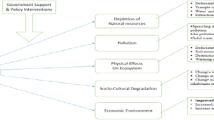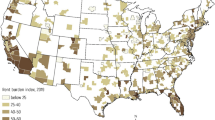Abstract
Happiness research has been a great success and has offered us great insights into the determinants and consequences of subjective well-being. As many contributions have accumulated, there are necessarily diminishing marginal insights. Most likely future happiness research will pursue the trodden paths. However, most fruitful results can be gained by comparing happiness to other human goals; by critically analyzing how the insights gained can be used for policy; by finding out what institutional prerequisites support happiness; as well as by turning to big issues so far neglected. The impact of tourism on life satisfaction is provided as an example.
Similar content being viewed by others
Notes
References
Bartolini S, Bilancini E, Pugno M (2008) Did the decline in social capital decrease American happiness? A relational explanation of the happiness paradox. University of Siena Department of Economics, Working paper 513
Becchetti L, Cermelli M (2018) Civil economy: definition and strategies for sustainable well-living. Int Rev Econ 65(3):329–357
Benz M, Frey BS (2008) Being independent is a great thing: subjective evaluations of self-employment and hierarchy. Economica NS 75(298):362–383
Bruni L (2006) Civil happiness. Economics and human flourishing in historical perspective. Routledge, London and New York
Bruni L (2012) Market and happiness. Spec Issue Int Rev Econ 59(4):321–475
Bruni L, Porta PL (eds) (2005) Economics and happiness. Framing the analysis. Oxford University Press, Oxford
Bruni L, Porta PL (eds) (2007) Handbook on the economics of happiness. Edward Elgar, Cheltenham and Northampton
Bruni L, Stanca L (2008) Watching alone: relational goods, television and happiness. J Econ Behav Organ 65(3–4):506–528
Bruni L, Zamagni S (2004) Economia civile, efficienza, equità, felicità pubblica. Mulino, Bologna
Bruni L, Zamagni S (2015) L’economia civile—Un’altra idea di mercato. Mulino, Bologna
Clark AE (2018) Four decades of the economics of happiness. Where next? Rev Income Wealth 64(2):245–269
Clark AE, Flèche S, Layard R, Powdthavee N, Ward G (2017) The origins of happiness. The science of well-being over the life course. Princeton University Press, Princeton
Diener E, Lucas R, Schimmack U, Helliwell J (2009) Well-being for public policy. Oxford University Press, Oxford
Diener E, Oishi S, Tay L (2018) Handbook of well-being. DEF Publishers, Salt Lake City
Dolan P, Peasgood T, White M (2008) Do we really know what makes us happy. A review of the economic literature on the factors associated with subjective well-being. J Econ Psychol 29(1):94–122
Dorn D, Fischer J, Kirchgässner G, Sousa-Poza A (2007) Is it culture or democracy? The impact of democracy and culture on happiness. Soc Indic Res 82(3):505–526
Easterlin RA (2003) Explaining happiness. PNAS Proc Natl Acad Sci 100(19):11176–11183
Economist (2016) Schumpeter. Against happiness. September 24th, 60. https://www.economist.com/business/2016/09/24/against-happiness
Farrow K, Grolleau G, Mzoughi N (2018) What in the word! The scope for the effect of word choice on economic behavior. Kyklos 71(4):557–580
Frey BS (2003) Publishing as prostitution. Public Choice 116(1–2):205–233
Frey BS (2008) Happiness—a revolution in economics. MIT Press, Cambridge
Frey BS (2009) Economists in the pits. Int Rev Econ 56(4):335–346
Frey BS (2018) Economics of happiness. Springer, Cham
Frey BS, Stutzer A (2000) Happiness, economy and institutions. Econ J 110(446):918–938
Frey BS, Stutzer A (2002a) What can economists learn from happiness research? J Econ Lit 40(2):402–435
Frey BS, Stutzer A (2002b) Happiness and economics. How the economy and institutions affect well-being. Princeton University Press, Princeton
Frey BS, Stutzer A (2010) Recent advances in the economics of individual subjective well-being. Soc Res 77(2):679–714
Frey BS, Gallus J, Steiner L (2014) Open issues in happiness research. Int Rev Econ 61(2):115–125
Glaeser EL, Gottlieb JD, Ziv O (2016) Unhappy cities. J Labor Econ 34(S2):S129–S182
Gui B, Sugden R (eds) (2005) Economics and social interaction: accounting for interpersonal relations. Cambridge University Press, Cambridge
Helliwell JF, Huang H (2008) How’s your government? International evidence linking good governance and well-being. Br J Polit Sci 38(4):595–619
Hollander-Blumoff R, Tyler TR (2008) Procedural justice in negotiation: procedural fairness, outcome acceptance, and integrative potential. Law Soc Inq 33(2):473–500
Kahneman D, Krueger AB (2006) Developments in the measurement of subjective well-being. J Econ Perspect 20(1):3–24
Kahneman D, Diener E, Schwarz N (eds) (1999) Well-being: the foundations of hedonic psychology. Russel Foundation, New York
Layard R (2005) Happiness. Lessons from a new science. Penguin, London
Layard R, O’Donnell G (2015) How to make policy when happiness is the goal. World Happiness Rep 2015 Chapter 4:76–87
Lind AE, Tyler TR (1988) The social psychology of procedural fairness. Plenum Press, New York
Lindqvist E, Östling R, Cesarini D (2018) Long-run effects of lottery wealth on psychological well-being. National Bureau of Economic Research Working Paper 24667
O’Donnell G, Oswald AJ (2015) National well-being policy and a weighted approach to human feelings. Ecol Econ 120:59–70
Odermatt R, Stutzer A (2017) Subjective well-being and public policy. In: Diener E, Oishi S, Tay L (eds) (2018) Handbook of well-being. DEF Publishers, Salt Lake City
OECD (2017) How’s life? Measuring well-being. OECD, Paris
Ryff CD (2017) Eudaimonic well-being, inequality, and health: recent findings and future directions. Int Rev Econ 64(2):159–178
Sen AK (1977) Rational fools: a critique of the behavioral foundations of economic theory. Philos Public Aff 6(4):317–344
Sgroi D, Hills T, O’Donnell G, Oswald AJ, Proto E (2017) Understanding happiness. A cage policy report. Centre for Competitive Advantage in the Global Economy, The University of Warwick, Coventry
Weimann J, Knabe A, Schöb R (2015) Measuring happiness. The economics of well-being. MIT Press, Cambridge
White MD (2015) The problem with measuring and using happiness for policy purposes. Working paper, Mercatus Center, George Mason University
Author information
Authors and Affiliations
Corresponding author
Ethics declarations
Conflict of interest
The author declares that he has no conflict of interest.
Additional information
Publisher's Note
Springer Nature remains neutral with regard to jurisdictional claims in published maps and institutional affiliations.
Rights and permissions
About this article
Cite this article
Frey, B.S. What are the opportunities for future happiness research?. Int Rev Econ 67, 5–12 (2020). https://doi.org/10.1007/s12232-019-00318-9
Received:
Accepted:
Published:
Issue Date:
DOI: https://doi.org/10.1007/s12232-019-00318-9




